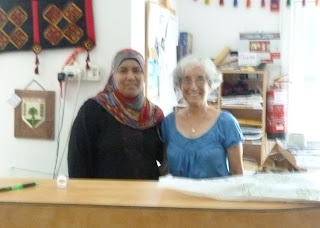I had heard of them through the New Israel Fund (which used to support it) and also bought something from one of the representatives in Kiryat Malachi 2 or 3 summers ago at Festival B'Shekel.
 |
| Lakiya from the highway |
The women do not have the funds to put new ones up in key places. The city told them it would cost 3000 shekels (about $800 US).
 |
| Camel outside of town |
 |
| Nice home and business |
 |
| Woman walking in town |
 |
| Mosque |
 |
| Sign on outside of the center |
The visitors' tent was not in use the day we visited, but Haim said that when he came with a large group, it was used to welcome the group and discuss their cooperative.
 |
| Visitors' Tent |
http://www.desert-embroidery.org/
The following below in blue is from http://www.greenprophet.com/2008/12/bedouin-project-interchange/
As the Israeli Bedouin culture, which was once partially nomadic, adapts to the fast-paced ways of modern living, its women are being left behind. Undervalued at home, and with few skills that can lead to gainful employment (most are not allowed to leave the home for outside work), not only do Israeli Bedouin women suffer from high rates of poverty and abuse, they can pass on a sense of hopelessness to their children — a cycle that never ends.
Determined to find a way to empower themselves, a group of four Bedouin women from the Bedouin town of Lakia, founded the Association for the Improvement of Women’s Status in 1992. Since creating their NGO, the women have been able to build a number of meaningful projects in their society that generate income and a sense of self-worth.
As the once nomadic people transition into the modern way of life, the women are becoming more marginalized. In the past, they had responsibilities in the house — collecting water and wood, taking care of the livestock and setting up the family tent. These are skills no longer valued in their society. But that’s changing.
The association gives fulltime work to 70 Bedouin women. (In the past, up to 160 women participated, then 90 but as outside support diminished, so did the numbe of participants.) Teaching the traditional art of embroidery, and then selling the products is the association’s central activity, but there are other community activities that have branched out to further strengthen their society from within.
One is an adult literacy program the women have created, another a special kindergarten for their children, and a third a mobile library, which passes through different neighbourhoods to spread literacy, and human rights education among the town’s children.
While only a handful of Bedouin women went to university 10 years ago, now over 350 are enrolled.
The woman in charge when we visited had 5 or 6 children. One was studying medicine in Romania, I believe. Another was a nurse in Barzilai hospital in Ashkelon. She was very proud of them. I had asked her about her children and then showed her mine too!
 |
| Some items for sale |
I also bought a cell phone or glasses case. The pattern on it represented the sweet and sour of life. It probably took four hours to make. Some women might have time to do it all at once while others would do a bit and then return to housework or caring for children, grabbing a few minutes to embroider when possible. It cost 40 shekels. If it took 4 hours to make, then the hourly wage would have been about $2.70.
Here are some of the pictures on the wall explaining the projects.
 |
| Lectures for women |
 |
| Project Explanation |
 |
| Young Leadership |
 |
| 3 women at work |
 |
| Hands at Work |
There were other visitors from Germany, one of whom is a financial supporter of the Joe Alon Center for Beduin Culture at nearby at Kibbutz Lahav. We had visited it 3 or 4 years ago. If you are ever nearby, it is definitely worth a visit. http://www.joealon.org.il/english/eng_beduin.htm









No comments:
Post a Comment